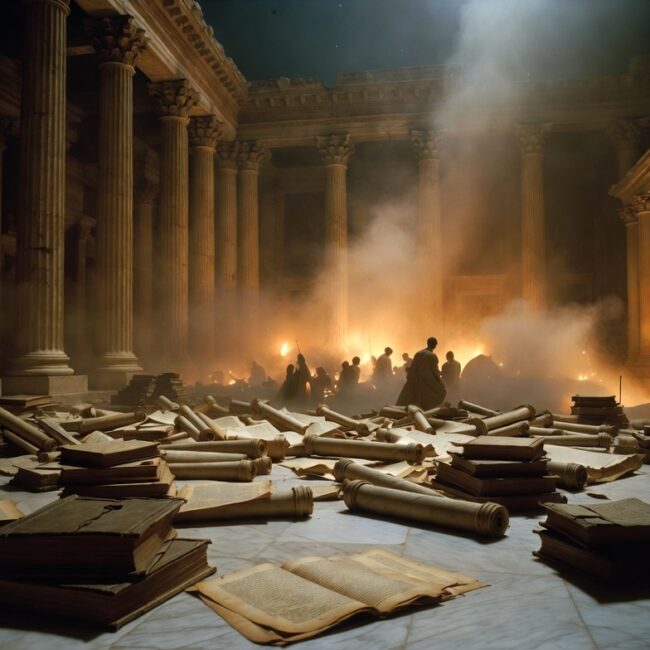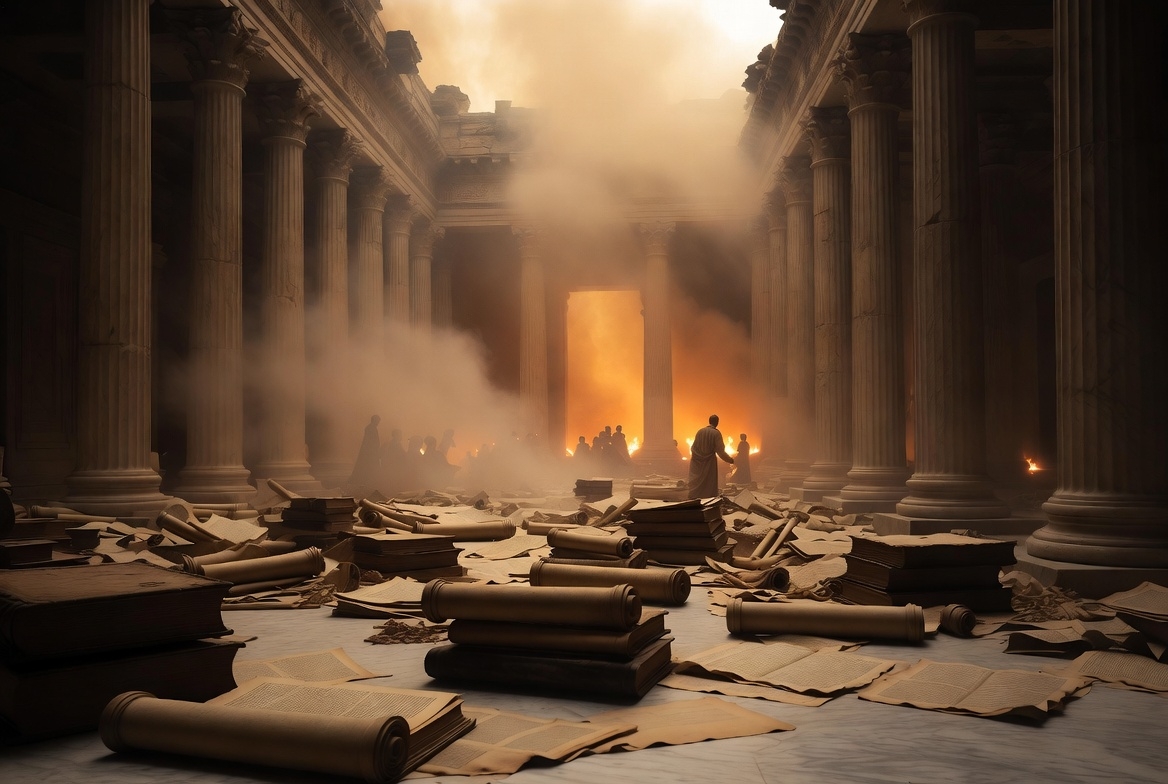They say knowledge is power. But power, like fire, can destroy the very thing it was meant to protect.
There was once a city where the known world tried to gather everything it had ever learned in one place. A city where scholars from every corner of civilization came to think, argue, and write. It stood on the glittering edge of the Mediterranean and was called Alexandria. And at its center was something the world had never seen before — a library that sought to contain all of human knowledge.
When ships arrived in the great harbor, they were searched not only for goods, but for books. The scrolls were taken, copied by skilled scribes, and returned to their owners. The copies remained behind, stored in endless shelves of papyrus.
In time, the Library of Alexandria held hundreds of thousands of scrolls: philosophy from Greece, astronomy from Babylon, poetry from Egypt, mathematics from India. It was the first serious attempt to build a universal memory.
For a brief moment in history, it worked.

Imagine walking through its halls. Oil lamps flicker against walls lined with scrolls. The air smells faintly of ink, wax, and dust. You might hear the murmur of scholars debating the movements of planets or the meaning of a forgotten word.
There were classrooms, lecture spaces, even living quarters for visiting thinkers. It was not just a library; it was an entire ecosystem devoted to curiosity.
But what most people do not realize is how quietly it disappeared.
The story we are told is dramatic: a fire set by Julius Caesar during his civil war in 48 BCE spreading to the docks, consuming everything in its path, and reducing centuries of knowledge to ash.
That image is powerful, but it is only part of the truth. The Library did not die in a single night. It unraveled slowly, over generations, through a mix of neglect, war, and ideology.
When Caesar’s flames reached the port, they destroyed warehouses filled with books that were waiting to be catalogued for the Library. Thousands of scrolls were lost, but the main collection within the royal quarter likely survived.
For a while, Alexandria continued to function as a center of learning. Yet with every political shift, the library’s support weakened.

By the time of the Roman Empire, it had already begun to fade. Funding declined, scholars left, and what was once a beacon of inquiry became a relic of the past. A secondary library, the Serapeum, tried to keep the spirit alive, but it too fell centuries later when the empire embraced Christianity.
Temples were closed, and anything tied to “pagan knowledge” was seen as dangerous. The Serapeum was destroyed. The remaining scholars scattered. The light went out completely.
No one can say exactly what was lost. Some historians estimate that half the world’s written works vanished. Entire schools of philosophy disappeared.
We only know the names of some authors because later writers mentioned them in passing. The rest is silence.
What was destroyed in Alexandria was more than a building. It was a vision — the belief that all human knowledge could coexist, that wisdom did not belong to one people or one faith but to everyone. When the Library fell, that idea fell with it.
For centuries afterward, the memory of Alexandria haunted those who cared about learning. Medieval monks whispered about it like a lost paradise.
Renaissance scholars invoked it as both a warning and a dream. Even now, when digital data is lost or archives are erased, people call it “another Alexandria.” The ghost still lingers.
What makes the story almost unbearable is that we do not even know what the Library looked like. No ruins remain, no drawings, no floor plans.
Historians can only guess where it stood. It exists now as an absence — a reminder of how easily civilization forgets itself.
Perhaps that is why its story feels so urgent. Because the truth is that knowledge has always been fragile. It depends on stability, patience, and protection.
Empires collapse faster than ideas can be copied. And each time power changes hands, what was once celebrated can suddenly become forbidden.
When the scrolls burned, they did not just destroy words; they broke connections. Centuries of accumulated understanding vanished, leaving humanity to rebuild its memory from fragments.
It is possible that within those lost texts were discoveries that could have changed the course of science or philosophy. We will never know.
Today, near the same harbor, a new library stands — the Bibliotheca Alexandrina. Its curved glass roof reflects the sea and sky, a modern monument to the dream that once burned.
Inside are millions of books, archives, and digital records. It is beautiful and ambitious, but also vulnerable in its own way, surrounded by noise and distraction.
Somewhere in that building, a small inscription reads:
“For those who seek knowledge for its own sake.”
That sentence feels like an echo from the ancient world.
The Library of Alexandria is remembered as a tragedy, but perhaps its destruction tells us something about ourselves. We do not always lose knowledge through malice.
Sometimes we lose it through indifference. Through the slow erosion of curiosity. Through the comforting illusion that someone else, somewhere, is keeping the record safe.
Maybe the real story is not about a fire at all, but about a warning — that wisdom can disappear quietly while the world carries on as if nothing happened.
If this story made you pause, do not let it disappear again. Look it up. Read the records. The truth is there if you search for it.










